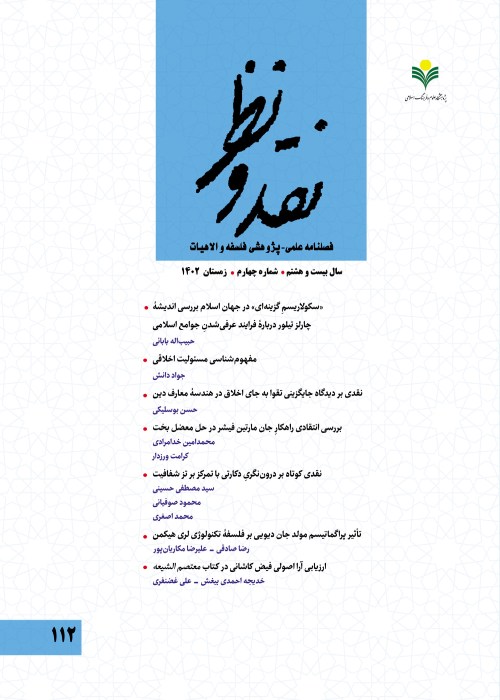The Human Dignity In Kant's Ethics
Abstract:
In the second formula of categorical imperative (act so that you treat humanity, whether in yourself or any other person, always, as an end and never as a means only), Kant emphasizes upon the intrinsic equal value of each person which does, in fact, enunciate a fundamental moral, political and religious principle presupposed in the ordinary moral judgments of nearly everyone today. Intrinsic dignity of persons, first, excludes him from thingness and justice in political domain. Persons are "self-existent" ends, having worth simly because they exist. Dignity for persons not only confines the others but also oneself (self-respect & self-regard), and therefor gives rise to duties for others and the self. Dignity for persons imply benevolence (good will) but it is not enough. Sympathy in imagination and empathy in feeling and emotion, and beneficence in practical domain is necessary. In the all, these views are based on the practical reson not moral sense. In this paper I analyse Kant’s view and implications and presuppositions.
Keywords:
Language:
Persian
Published:
Journal of Philosophy & Theology, Volume:16 Issue: 1, 2011
Page:
136
magiran.com/p918488
دانلود و مطالعه متن این مقاله با یکی از روشهای زیر امکان پذیر است:
اشتراک شخصی
با عضویت و پرداخت آنلاین حق اشتراک یکساله به مبلغ 1,390,000ريال میتوانید 70 عنوان مطلب دانلود کنید!
اشتراک سازمانی
به کتابخانه دانشگاه یا محل کار خود پیشنهاد کنید تا اشتراک سازمانی این پایگاه را برای دسترسی نامحدود همه کاربران به متن مطالب تهیه نمایند!
توجه!
- حق عضویت دریافتی صرف حمایت از نشریات عضو و نگهداری، تکمیل و توسعه مگیران میشود.
- پرداخت حق اشتراک و دانلود مقالات اجازه بازنشر آن در سایر رسانههای چاپی و دیجیتال را به کاربر نمیدهد.
In order to view content subscription is required
Personal subscription
Subscribe magiran.com for 70 € euros via PayPal and download 70 articles during a year.
Organization subscription
Please contact us to subscribe your university or library for unlimited access!


